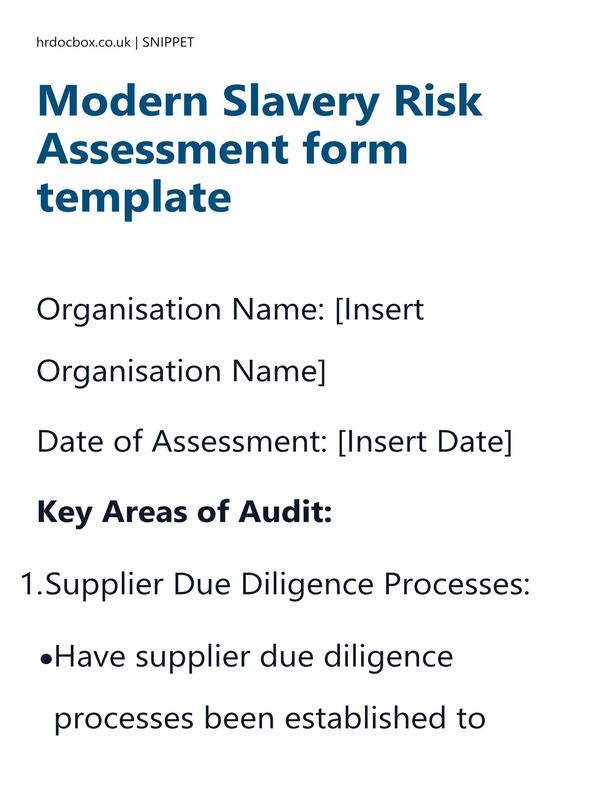Modern Slavery Risk Assessment form template


Our Modern Slavery Risk Assessment identifies vulnerabilities, safeguarding against exploitation and ensuring ethical business practices.
- Includes 12 months' access to the Modern Slavery Risk Assessment form template, with all updates provided free of charge and notified to you.
- UK-specific accuracy.
- 416 words over 2 pages.
- Last updated 02/04/2024.
- Format: Word / XLS / plain text / email.
- Delivery: Instant download after purchase (no physical item).
- Access: Download link shown here after checkout.
- This Modern Slavery Risk Assessment form template will SAVE you up to 1 hour 30 mins drafting & research, save you money, and reduce your risk.
Modern Slavery Risk Assessment
Organisation Name: [Insert Organisation Name]
Date of Assessment: [Insert Date]
Key Areas of Audit:
-
Supplier Due Diligence Processes:
-
Have supplier due diligence processes been established to assess modern slavery risks?
-
Are suppliers required to undergo assessments and audits to evaluate compliance with anti-slavery policies and regulations?
-
Is there a procedure in place for addressing any identified instances of modern slavery within the supply chain?
-
-
Compliance with Modern Slavery Clauses in Contracts:
-
Have modern slavery clauses been integrated into contracts with suppliers and subcontractors?
-
Are these clauses effectively communicated and enforced throughout the supply chain?
-
Is there a mechanism for monitoring and verifying supplier compliance with
-
This is a 30% preview of the Modern Slavery Risk Assessment form template. For instant full access, purchase this item or a parent bundle.
Modern Slavery Risk Assessment form template purpose
The Modern Slavery Risk Assessment tool enables organisations to assess and mitigate the risk of modern slavery within their operations and supply chains. By evaluating various factors such as geographical locations, business relationships, and industry practices, it helps identify potential vulnerabilities and areas of concern.
This assessment aids in developing robust strategies and policies to combat modern slavery, ensuring compliance with legal requirements and ethical standards. By proactively addressing these risks, organisations can uphold their commitment to human rights and contribute to eradicating modern slavery from their business practices and wider society.
Practical application of a Modern Slavery Risk Assessment form template
- The Modern Slavery Risk Assessment form template should be actioned / delivered annually / when a new supplier is taken on.
Compliance
Compliance
This Modern Slavery Risk Assessment form template incorporates relevant UK laws and HR standards, including those listed below:
-
Modern Slavery Act 2015: Requires organisations to assess and address modern slavery risks within their operations and supply chains.
-
Equality Act 2010: Ensures that the risk assessment process does not discriminate against individuals based on protected characteristics.
-
Data Protection Act 2018 (incorporating GDPR): Mandates the handling of personal data within the risk assessment in compliance with data protection principles.
-
Ethical Trading Initiative (ETI) Base Code: Provides guidance on ethical labour practices and may serve as a best practice reference for modern slavery risk assessments.
-
UK Government Guidance on Modern Slavery Reporting: Offers best practice guidance for organisations on conducting risk assessments and reporting obligations under the Modern Slavery Act.
Modern Slavery Risk Assessment workflow
Modern Slavery Risk Assessment workflow
Check which resources should be implemeted before and/or after the Modern Slavery Risk Assessment form template, to understand the workflow.
Modern slavery policy
Our Modern Slavery Policy template equips organisations to address regulatory requirements and ethical concerns seamlessly, ensuring responsible practices.
Modern slavery policy statement form
Our Modern Slavery Policy Statement empowers ethical practices, showcasing dedication to responsible conduct and accountability.
Practical example
Practical example
Instantly unlock with a purchase.
Instantly unlock with a purchase.
Scenario
ABC Limited, a UK-based company, takes proactive steps to address modern slavery risks in its supply chain. HR Manager Sarah leads the implementation of a Modern Slavery Risk Assessment Form to identify and mitigate potential risks within the company's operations.
Training and Awareness
Sarah ensures that all relevant employees receive training on identifying and reporting modern slavery risks. Training sessions cover the purpose and use of the Modern Slavery Risk Assessment Form, as well as the legal and ethical implications of modern slavery.
Rollout and Implementation
Once the Modern Slavery Risk Assessment Form is finalised, Sarah oversees its rollout and implementation across the organisation. She communicates clear instructions on how to use the form and establishes reporting mechanisms for capturing and escalating any identified risks.
Monitoring and Evaluation
Sarah institutes regular monitoring and evaluation processes to assess the effectiveness of the Modern Slavery Risk Assessment Form. The team conducts periodic reviews to identify trends, address emerging risks, and update the form as necessary to enhance its efficacy.
Reporting and Transparency
Sarah ensures transparency by reporting the outcomes of the Modern Slavery Risk Assessment Form to senior management and stakeholders. The reports highlight key findings, mitigation measures implemented, and areas for improvement to demonstrate ABC Limited's commitment to combatting modern slavery.
Continuous Improvement
Sarah fosters a culture of continuous improvement by soliciting feedback from stakeholders and incorporating suggestions for enhancing the Modern Slavery Risk Assessment Form and associated processes. This iterative approach ensures that ABC Limited remains vigilant in its efforts to prevent modern slavery.
Frequently Asked Questions about a Modern Slavery Risk Assessment form template
Frequently Asked Questions about a Modern Slavery Risk Assessment form template
-
Can I use the Modern Slavery Risk Assessment form template in my small business?
Yes. The Modern Slavery Risk Assessment form template is designed to be flexible and suitable for organisations of all sizes, including small businesses and charities. It follows UK employment law best practice, so even if you don't have an in-house HR team, you can confidently apply it.
-
Is the Modern Slavery Risk Assessment form template compliant with 2026 UK employment law?
Absolutely. Like the Modern Slavery Risk Assessment form template, all of our templates are drafted with the latest ACAS guidance and UK employment legislation in mind. We review and update them regularly, so you can be confident they remain compliant.
-
Can I customise the Modern Slavery Risk Assessment form template for my organisation?
Yes, we highlight the areas of the Modern Slavery Risk Assessment form template that you need to update with your own details, and where you need to make decisions to suit your situation. This saves you time and ensures that you meet best practice.
-
Do I get instant access to the Modern Slavery Risk Assessment form template?
Yes. Once purchased, you'll be able to download the Modern Slavery Risk Assessment form template instantly. Templates are provided in editable Word or Excel format so you can customise them easily, and in PDF format for easy sharing.
-
What if I need more help, not just a Modern Slavery Risk Assessment form template?
If you're looking for broader support, we also offer toolkits and library bundles that include the Modern Slavery Risk Assessment form template, along with other HR templates and policies for fully managing your situation. These may be more cost-effective if you need deeper advice.
-
Why should I use this Modern Slavery Risk Assessment form template, and not AI to generate it?
The risk of using a free AI-generated template 'without review' includes your legal exposure, missing context, and no awareness of the wider process, whereas purchasing the Modern Slavery Risk Assessment form template from us mitigates that risk.
